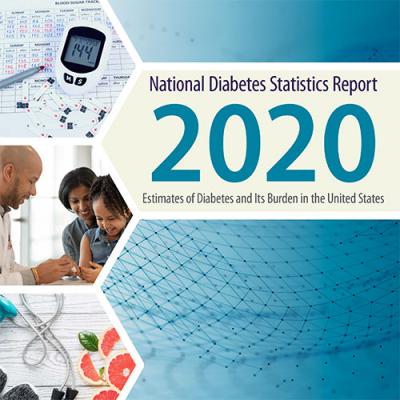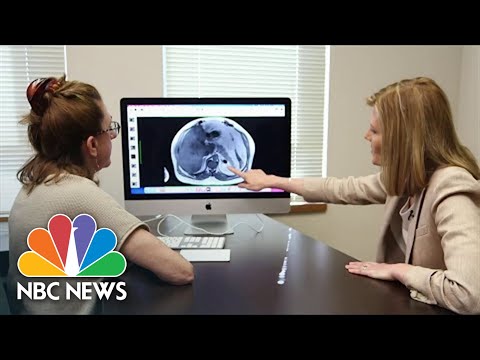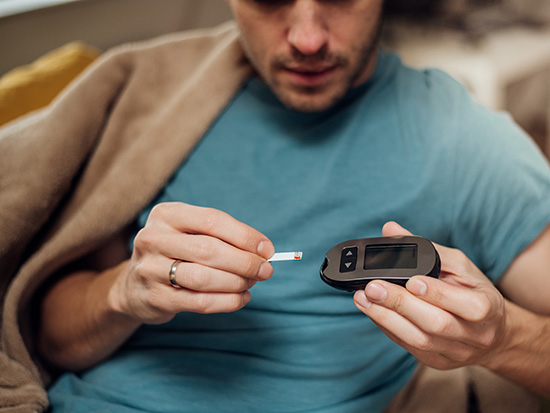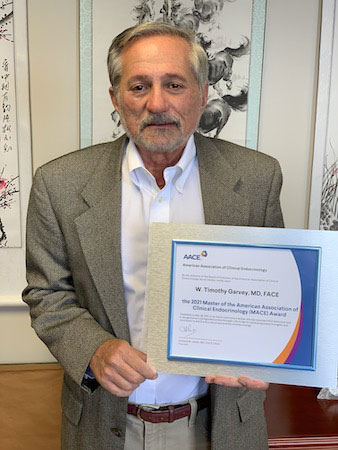DRC News
The UAB Diabetes Research Center hosts many events all year long. If you have an event you wish to see on this page please email all the details to the DRC.
Welcome to the Diabetes Research Center
The Diabetes Research Center (DRC) focuses on developing new methods to treat, prevent, and ultimately cure diabetes and its complications. The DRC is a multidisciplinary operation with faculty researchers from UAB's schools of Health Professions, Medicine, and Public Health, among other units. It operates in collaboration with the UAB Comprehensive Diabetes Center to promote excellence in diabetes research and patient care. The DRC supports the areas of animal physiology, human biology and intervention and translational research. It is one of the NIDDK-sponsored diabetes research centers in the U.S. View publications funded by the DRC at PubMed website.
News
UAB researchers part of GRADE study investigating glucose medications in Type 2 diabetes
University of Alabama at Birmingham researchers recently presented NIH-funded findings regarding differences in medication acceptance, quality of life, insulin secretion, mortality and other outcomes among four commonly used Type 2 diabetes medications.
Type 1 diabetes: B cell-derived natural antibodies suppress autoimmune pathogenesis
Researchers have discovered the novel mechanism that underlies a previously reported observation that infection by group A Streptococcus bacteria reduces the risk of later developing Type 1 diabetes.
Diabetes diagnoses might get much more specific in the future, UAB expert says
Usually, a diabetes diagnosis begins with a label: either Type 1 or Type 2 diabetes. Patients with diabetes are typically assigned one of these two labels and then treated accordingly.
Both high-protein and normal-protein diets are effective for T2D management
New findings from the University of Alabama at Birmingham indicate that the type of protein in the diet is not as important as the overall amount of weight loss for those with Type 2 diabetes.
In Type 1 diabetes, verapamil prevents decline of IGF-1 and promotes beta-cell IGF-1 signaling
In 2012, University of Alabama at Birmingham researcher Anath Shalev, M.D., reported that a decades-old blood pressure medication called verapamil completely reversed diabetes in animal models. In 2018, the team had translated these findings into a randomized, controlled, clinical trial, demonstrating significantly improved beta cell function for one year in human subjects with recent onset Type 1 diabetes. By last year, in a small follow-up study, Shalev and colleagues had found that adult Type 1 diabetes patients taking oral verapamil required less daily insulin and showed evidence of beneficial immune modulation for as long as two years after first diagnosis.
UAB receives $3.7 million to study diabetes in minority youth
The prevalence of Type 2 diabetes in youth is increasing in the United States, primarily among minorities, with Black and Hispanic youth showing the greatest increase. Neither the reason for the increase nor the mechanism underlying the disproportionate risk in minority youth is known.
Three UAB studies look at obesity in-utero and how it affects offspring as part of four-center study
A new study, published in the Journal of the American Heart Association, suggests that what happens in the womb could determine whether the offspring will develop obesity or other metabolic diseases later in life.
What are continuous glucose monitors, and how can they help you?
More than 7 million Americans have diabetes severe enough to require daily insulin injections and frequent finger-pricks to check their blood glucose levels. Maintaining those glucose levels in the proper range is maddeningly personal.
This diabetes technology is transforming care one meal at a time, expert says
Late last year, UAB photographer Steve Wood began to wonder if middle age was catching up with him. “I was tired all the time — I just had no energy,” he said. He was also losing weight without dieting or exercise, and was making an unusual number of trips to the bathroom.
Demark-Wahnefried named recipient of ASPO Joseph F. Fraumeni Jr. Distinguished Achievement Award
The University of Alabama at Birmingham’s Wendy Demark-Wahnefried, Ph.D., professor and Webb Endowed Chair of Nutrition Sciences in the School of Health Professions, was awarded the 2023 Joseph F. Fraumeni, Jr. Distinguished Achievement Award from the American Society of Preventive Oncology.
Type 1 diabetes: first clinical trial of GABA/GAD in newly diagnosed, very young children
For the first time, humans with newly diagnosed Type 1 diabetes, or T1D, have received two treatments called GABA and GAD that have shown promise in animal studies and in isolated human pancreas islets. This investigator-initiated clinical trial, published in Nature Communications, focused exclusively on children with recent onset T1D.
George Howard, DrPH, named leading stroke scientist by the American Stroke Association
The American Stroke Association has named George Howard, DrPH, distinguished professor of Biostatistics in the University of Alabama at Birmingham School of Public Health, the winner of the David G. Sherman Lecture Award. The award recognizes lifetime contributions for investigation, management, mentorship and community service in the stroke field.
Reflecting on Dr. Stuart Frank’s legacy: a career marked by kindness
This week, leaders from across UAB gathered to honor Stuart J. Frank, M.D., at the naming dedication of the Stuart J. Frank, M.D. Conference Room in the Boshell Diabetes Building (BDB). Hallways were lined with cherished colleagues, friends, and mentees.
Dieting for the new year? Learn more about unhealthy eating motives and how to break them
The new year often brings new resolutions, the majority of which are centered around physical health or weight loss, research shows. Diet and nutrition fads flood the internet with promises of quick weight loss, but many dieters find the regimens difficult to maintain.
Researcher turns startup founder to pursue promising oral diabetes drug
For many people who have Type 1 diabetes, life can become a seven-letter word: insulin.
“One of the repeatedly expressed challenges of those with diabetes is to be completely dependent on daily injections of insulin or insulin pumps,” said Anath Shalev, M.D., director of UAB’s Comprehensive Diabetes Center (UCDC) and professor in the Department of Medicine. Shalev has spent the past two decades pursuing a new treatment option — one that can actually reverse the effects of diabetes. She has found something so promising that it convinced her to do something she had always resisted: start a company.
High blood pressure and diabetes as stroke risk factors decrease in older populations
The United States is seeing an upward trend in the age distribution of the general population. By 2050, it is anticipated over 50 percent of stroke events will occur in those over the age of 75. However, the majority of stroke-related studies focus on populations that are younger than this age.
Researcher receives grant to study impact of circadian rhythm disruptions on alcohol-related liver disease
A researcher at the University of Alabama at Birmingham Department of Pathology has received an R21 award from the National Institute on Alcohol Abuse and Alcoholism. This grant will be used to better understand whether disruptions in circadian rhythm can negatively influence liver health and whether these disruptions are risk factors for alcohol-related liver disease.
Coaching, food delivery and more: A new diabetes management study will soon enroll patients
The University of Alabama at Birmingham Department of Family and Community Medicine’s Vice Chair for Research Tapan Mehta, Ph.D., is partnering with investigators at the University of Mississippi Medical Center to lead a $3.6 million study to develop a sustainable and effective Type 2 diabetes management intervention in adults who have Type 2 diabetes and sub-optimal social determinants of health.
Dr. George Howard, Distinguished Professor of Biostatistics, retires after 23 years at the UAB School of Public Health
George Howard, DrPH, Distinguished Professor in the Department of Biostatistics, retired from the UAB School of Public Health on November 1, 2022. Dr. Howard’s career in Public Health and Medicine spans more than 40 years at UAB and previously at Wake Forest School of Medicine (previously Bowman Gray School of Medicine). Dr. Howard has also held visiting professor or adjunct positions at the Polish Mother's Memorial Hospital Research Institute in Lodz, Poland, and East Carolina University.
“Transformational” semaglutide can cut Type 2 diabetes risk by more than half
New research presented by University of Alabama at Birmingham researchers shows that a 2.4mg dose of the obesity drug semaglutide can reduce the risk of Type 2 diabetes, or T2D, by 60 percent.
Diabetes: TXNIP involved in increased secretion of glucagon from pancreatic alpha cells
In groundbreaking diabetes research over the past two decades, Anath Shalev, M.D., has shown that the protein TXNIP regulates survival and function of beta cells, the pancreatic cells that produce the hormone insulin to lower levels of glucose in the blood. Downregulation or inhibition of TXNIP in beta cells protects against diabetes in mouse models, and a repurposed clinical drug that inhibits TXNIP shows promising results in people with recent-onset Type 1 diabetes.
Rise in new-onset Type 2 diabetes among Alabama youth during COVID-19 pandemic
Alabama, a state with many counties in the United States Diabetes Belt, saw an increase in new-onset Type 2 diabetes among youth during the COVID-19 pandemic. Results published in the Journal of Clinical Endocrinology & Metabolism showed the significant increase and indicated that Medicaid enrollees and males were disproportionately affected by the disease.
Study shows an improved way to model Type 2 diabetes in mice
Carbohydrates are directly linked to the development of Type 2 diabetes, but a higher-carb diet is underused in research models.
Promising New Study Using Diet Changes To Treat Type 2 Diabetes
A study from the University of Alabama at Birmingham is looking into a drug-free approach to treat type 2 diabetes. The research focuses on using diet changes to target the fat around organs like the pancreas and liver.
W. Timothy Garvey, M.D., named University Professor
W. Timothy Garvey, M.D., was named University Professor in the School of Health Professions Department of Nutrition Sciences. Garvey joined UAB in 2003 as chair of the Department of Nutrition Sciences, where he served until 2018.
A novel therapy ameliorates obesity and Type 2 diabetes in mice fed a high-fat diet
A novel therapy developed at the University of Alabama at Birmingham ameliorates obesity and Type 2 diabetes in mice fed a high-fat diet. The therapy acts through sustained release of nitric oxide, a gaseous signaling chemical whose most important function in the body is relaxing the inner muscles of blood vessels.
Researchers find that genetic scores may identify risk of heart disease for people with Type 2 diabetes
According to the Centers for Disease Control and Prevention, more than 37 million Americans have diabetes, and approximately 90-95 percent of them have Type 2 diabetes. Individuals with Type 2 diabetes are at an increased risk of poor cardiovascular outcomes, leading to an estimated $37.3 billion a year in heart disease-associated care.
Five tips for a healthy diet
Maintaining a healthy diet is important for your body’s overall health, reducing risk from many chronic noncommunicable diseases, such as diabetes, heart disease and cancer.
Black adults are at a higher risk of developing diabetes due to genetic variations and social health determinants, research shows
In a recent study published in Circulation: Genomic and Precision Medicine, University of Alabama at Birmingham researchers found that, while many African Americans, especially those with a higher African ancestry proportion, have a favorable lipid profile, they are at a higher risk of developing diabetes than those of white/European ancestry. A favorable lipid profile indicates there are fewer components of body fat that can lead to cardiovascular and metabolic disease. Researchers believe this may be driven by genetic factors associated with geographic ancestry.
An oral medication shows benefits treating Type 1 diabetes for at least two years after diagnosis
Use of the drug verapamil to treat Type 1 diabetes continues to show benefits lasting at least two years, researchers report in the journal Nature Communications. Patients taking the oral blood pressure medication not only required less daily insulin two years after first diagnosis of the disease, but also showed evidence of surprising immunomodulatory benefits.
2021 Marchase Award winner Cherrington fights health disparities and chronic disease
The undue burden of obesity, diabetes and hypertension in the Deep South is a focus for the 2021 Marchase Award winner, Andrea Cherrington, M.D. The award celebrates and encourages interdisciplinary work at the University of Alabama at Birmingham.
UAB launches research collaboration to reduce disparities in chronic diseases in the Deep South
The University of Alabama at Birmingham, in partnership with other leading academic centers in Alabama, Mississippi and Louisiana, will establish the Deep South Center to Reduce Disparities in Chronic Diseases with a grant from the National Institutes of Health.
Should you skip breakfast? Eat dinner early? Is intermittent fasting good for you? Two UAB studies look for volunteers
Is eating breakfast really that important? Should you eat dinner early and go to bed on an empty stomach? Is intermittent fasting good for you? These are age-old questions that researchers at the University of Alabama at Birmingham are hoping to answer. UAB has launched two studies, one with people with Type 2 diabetes and one with people who are overweight, to find out whether changing when you eat can make you healthier.
UAB researchers find that 40 percent of young American adults have insulin resistance and cardiovascular risk factors
A recent study published in the Journal of Clinical Endocrinology and Metabolism by researchers at the University of Alabama at Birmingham found that nearly 40 percent of young adults without diabetes experience insulin resistance, a condition in which the body does not respond correctly to insulin and is unable to use glucose from the blood for energy.
UAB trial studying diet composition — with no weight loss — to treat Type 2 diabetes
A clinical trial now enrolling at UAB is taking an unusual approach to help patients with Type 2 diabetes. Instead of medications, the study is using diet alone to improve blood sugar control and remodel the body “by re-partitioning energy away from metabolically harmful lipid stores,” said Barbara Gower, Ph.D., professor in the Department of Nutrition Sciences.
UAB awarded NIH telehealth grant to fight diabetes in the Deep South
Two faculty in the School of Health Professions at the University of Alabama at Birmingham have been awarded an R01 grant from the National Institute of Diabetes and Digestive and Kidney Diseases to employ telehealth technologies to combat diabetes in rural, underserved areas.
Chen wins a VA Senior Research Career Scientist Award
In 2016, Yabing Chen, Ph.D., a University of Alabama at Birmingham professor of pathology and research scientist at the Birmingham VA Medical Center, received a prestigious VA Research Career Scientist Award that provided five years of salary.
W. Timothy Garvey selected to earn highest honor from AACE
W. Timothy Garvey, MD, Butterworth Professor of Medicine in the Department of Nutrition Sciences at the University of Alabama at Birmingham, was chosen to receive the Master of the American Association of Clinical Endocrinology (AACE) award. The MACE award is the highest honor to be awarded by AACE, the country’s leading professional organization of clinical endocrinologists.
SHP Insight, Vol. 10: W. Timothy Garvey - obesity, diabetes and more
In this episode, Andrew Butler, Ph.D., dean, UAB School of Health Professions, sits with W. Timothy Garvey, M.D., the Butterworth Endowed Professor in Nutrition Sciences and director of the UAB Diabetes Research Center. The two discuss his 4+ decades of studying obesity, diabetes, and more. Dr. Garvey talks about his "complication-centered" path of study, changing how the world defined obesity, and he gives his best advice to those struggling with weight - advice that may surprise you.
Goss receives $3 million NIH grant for family-based diet intervention treating fatty liver disease in adolescents
Amy Goss, Ph.D., assistant professor in the University of Alabama at Birmingham’s Department of Nutrition Sciences, has received a $3 million R01 grant to implement a family-based diet intervention to treat fatty liver disease and obesity in adolescents.
Who will benefit from new ‘game-changing’ weight-loss drug semaglutide?
For decades, Americans have fought a losing battle with obesity. Between 1960 and 2010, the prevalence of adult obesity in the United States nearly tripled, to 36 percent from 13 percent, according to the Centers for Disease Control and Prevention.
Metformin use reduces risk of death for patients with COVID-19 and diabetes
Editor's Note: The information published in this story is accurate at the time of publication. Always refer to uab.edu/uabunited for UAB's current guidelines and recommendations relating to COVID-19.
Media contacts: Jeff Hansen and Savannah Koplon
Use of the diabetes drug metformin — before a diagnosis of COVID-19 — is associated with a threefold decrease in mortality in COVID-19 patients with Type 2 diabetes, according to a racially diverse study at the University of Alabama at Birmingham. Diabetes is a significant comorbidity for COVID-19.
Novel Approaches to Diabetes
Take a look back at a critical conversation about diabetes with Dr. Anath Shalev and Dr. Fernando Ovalle during Novel Approaches to Diabetes.
Type 1 diabetes: Tannic acid encapsulation protects transplanted islets from rejection
Type 1 diabetes, or T1D, results from the autoimmune destruction of the insulin-producing cells of the pancreas. People with T1D require exogenous insulin and suffer swings in the levels of glucose in the blood that impact life expectancy and increase risks of cardiovascular disease, neuropathies and kidney failure.
Pro-inflammatory lipids precede Type 1 diabetes onset in mouse model and children
Type 1 diabetes, or T1D, is an autoimmune disease in which the body’s immune cells — led by inflammatory macrophages — attack and destroy the beta cells of the pancreas that produce insulin.
Study focuses on low-carb, high-fat diet effect on older populations
A new study, published in Nutrition and Metabolism, from researchers with the University of Alabama at Birmingham’s Nutrition Obesity Research Center observed improvements in body composition, fat distribution and metabolic health in response to an eight-week, very low-carbohydrate diet.
Novel diabetes drug candidate shows promising properties in human islets and mouse models
The University of Alabama at Birmingham and Southern Research have discovered a new drug candidate that offers a major advance in the treatment for diabetes.
Carb-restricted diet may result in benefits for adolescents with fatty liver disease
A new study from researchers with the University of Alabama at Birmingham’s Department of Nutrition Sciences suggests consumption of a moderately carbohydrate-restricted diet may result in decreased fatty liver tissue, as well as improvements in body composition and insulin resistance, in adolescents with non-alcoholic fatty liver disease.
Gower embodies UAB’s collaborative spirit through cross-campus partnerships
UAB is a unique place, says Barbara Gower, Ph.D., professor and vice chair for Research in the School of Health Professions Department of Nutrition Sciences. But not just because the university brought in nearly $300 million in NIH funding this past year, or because our orthopaedic surgeons offer total knee replacements without an overnight hospital stay for some patients.
Valene Garr Barry named UAB Diversity Champion
Valene Garr Barry, a graduate student pursuing a doctoral degree in the UAB School of Health Professions' Department of Nutrition Sciences and a pre-doctoral fellow of the Nutrition Obesity Research Center, was honored with the President’s Diversity Champion Award Feb. 21. The annual award recognizes employees, students and organizations that have helped create a more culturally diverse, inclusive university community through their achievements.
Study finds gene does not increase risk for Type 2 diabetes in all Hispanic/Latino background groups equally
A recent study found that people of Mexican background are more likely to be at risk for Type 2 diabetes than other Hispanic/Latino background groups. The study, which was led by Bertha Hidalgo, Ph.D., a professor of epidemiology at the University of Alabama at Birmingham School of Public Health, examined variants — alterations to the DNA sequence — of the SLC16A11 gene in six different Hispanic and Latino background groups: Mexican, South American, Central American, Dominican, Puerto Rican and Cuban. The study was published in Scientific Reports.
Garvey is 2017 ABOM Master Award Winner
UAB Scholar to Received Honor during Obesity Week
W. Timothy Garvey, MD is the recipient of the 2017 Master of the American Board of Obesity Medicine award, presented to a physician who has made significant contributions to the science, practice and/or advancement of obesity medicine. Dr. Garvey is Professor of Medicine and Chair of the Department of Nutrition Sciences at the University of Alabama at Birmingham.
AHA awards UAB a $3.7 million grant to further generational obesity research
The University of Alabama at Birmingham will launch the UAB Strategically Focused Obesity Research Center with a grant from the American Heart Association for $3.7 million over the next four years. The UAB SFOC is one of four sites in the AHA’s Strategically Focused Obesity Research Network that will work together to advance the field of obesity research.
Khaled Awarded Fullbright-Nehru
Mohammad Khaled, Ph.D., has been awarded a Fulbright-Nehru Academic and Professional Excellence Award to develop and improve research and teaching efforts in India related to Type 2 diabetes mellitus (T2DM). Khaled, professor emeritus in the UAB Department of Nutrition Sciences, will collaborate with the Department of Physiology at the University of Calcutta, India, to look at Type 2 diabetes mellitus specifically due to Helicobacter pylori (H. pylori) infections which are highly prevalent among Indian populations. This expands research Khaled conducted while a professor at UAB.






















































